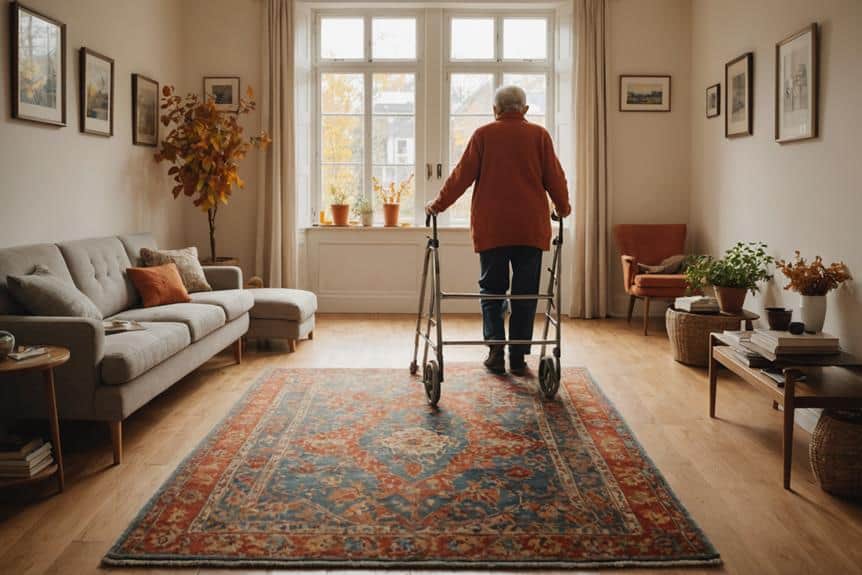To prevent falls as you age, start by identifying risks in your environment. Clear clutter, secure rugs, and improve lighting. Consider installation of handrails and non-slip mats, especially in the bathroom. Staying hydrated and getting your vision checked can help reduce dizziness. Regular exercise, like Tai Chi or yoga, builds strength and balance. It's also important to manage medications and keep up with health check-ups. Explore available resources, like local support services for home safety evaluations. Implementing these tips can greatly enhance your safety, and there's much more to discover to keep you secure and healthy.
Understanding Fall Risks
Environmental hazards also play a big role. Wet floors, poor lighting, and unsecured rugs can turn a simple walk into a dangerous situation. It's essential to be aware of these factors and take precautions, as they can greatly affect the safety and well-being of individuals, particularly the elderly. Additionally, understanding the importance of safeguarding vulnerable populations emphasizes the need for careful attention to these risks.
Medication management is another key area to evaluate. If you're taking multiple medications, especially five or more, you might face side effects that affect your balance and coordination. Be sure to discuss any concerns with your doctor, as certain health conditions like diabetes, heart disease, or cognitive impairments can further contribute to dizziness and balance issues.
Recognizing these fall risks is the first step towards preventing them. By understanding how visual impairments, environmental hazards, and medication management influence your safety, you can take proactive measures to reduce your risk of falls. Stay vigilant and make adjustments as necessary to keep yourself safe and secure.
Home Safety Modifications
Another essential modification is handrail installation on stairways. Handrails provide additional support, making it easier for you to move safely up and down the stairs. In bathrooms, using non-slip mats can further enhance safety by reducing the risk of slipping on wet surfaces. Additionally, consider utilizing cutting-edge technology for efficient care management that can help monitor safety at home. Don't forget to regularly maintain your home. Timely repairs can minimize hazards, such as fixing loose floorboards or ensuring that steps are stable. If you're unsure about what modifications to make, local councils often offer assessments and support for necessary home adaptations. They can help tailor your living environment for maximum fall prevention.
Health and Nutrition Tips
Staying hydrated is another essential aspect of your health. Aim to drink 6 to 8 glasses of fluids daily. Proper hydration strategies can improve your overall health and reduce dizziness, a common risk factor for falls. Additionally, regular consumption of calcium and vitamin D is important for maintaining strong bones. As you age, make certain you're getting enough of these nutrients to help prevent osteoporosis and related fractures. Understanding care needs can also help guarantee that you have the right support in place to maintain your health.
Don't forget the importance of regular eye and hearing examinations. These check-ups can help identify issues that affect your balance, allowing for timely interventions to reduce fall risk. By focusing on nutrition and health, you can create a strong foundation that supports your stability and overall well-being. Remember, taking care of your body isn't just about avoiding falls; it's about enjoying life to the fullest.
Exercise for Strength and Balance
Exercise for Strength and Balance
- Tai Chi: This gentle form of martial arts promotes balance and flexibility, making it especially beneficial for older adults seeking to enhance their stability and coordination. Engaging in activities like customised care plans can also support your journey to improved physical health.
- Yoga: Focuses on stability, strength, and mind-body connection.
- Sit-to-Stand Exercises: These help improve leg strength and coordination.
- Standing on One Foot: A simple balance training exercise that challenges stability.
- Community Classes: Join tailored strength and balance programs at local centers for social interaction and support.
Incorporating these exercises into your routine can lead to significant improvements in your overall stability. Simple actions, like maintaining a stable position with your feet together, can enhance your balance over time. Remember, it's important to consult with a healthcare professional before starting any new exercise program. They can help verify the activities are safe and appropriate for your individual health needs.
Resources for Support and Assistance
One excellent resource is the free Age UK advice line at 0800 678 1602. This year-round service connects you with specialist advisers at over 120 local centers, providing tailored support for fall prevention and health management. In addition, the CDC offers extensive resources on fall prevention and bone health, equipping you with the knowledge needed to make informed choices.
For those seeking expert advice, the National Falls Prevention Resource Center provides educational materials and program guidelines. These resources promote awareness and effective strategies, ensuring you're well-prepared to prevent falls. Moreover, your local council can conduct assessments for necessary home adaptations, enhancing safety in your living environment. Organizations like Age UK may assist with small repairs and safety evaluations, giving you peace of mind.





